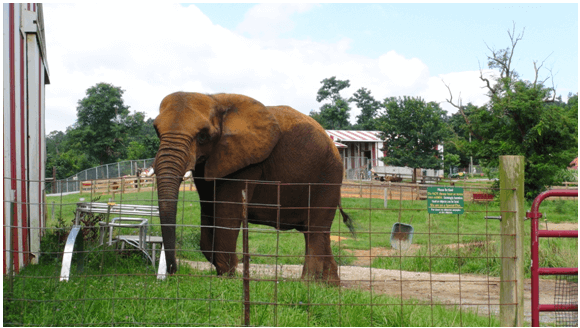Why Are Zoos Sentencing Elephants to Solitary Confinement?
Even though it’s known that isolation is emotionally devastating for elephants, the Natural Bridge Zoo in Virginia has kept an elephant named Asha alone for years. She spends her nights in a cold, damp barn, and when the zoo is open, she spends her days plodding in endless circles with riders on her back. A dejected Asha has been observed standing in her paddock and rocking back and forth—a well-recognized sign of profound deprivation and “zoochosis,” a mental disease caused by intense confinement.
PETA has asked the USDA to send in an elephant expert after a recent broadcast by a local news station showed a reporter who was allowed to approach this powerful, multi-ton animal freely. And in the pen where Asha was kept, standing water was visible on the concrete floor and feces were piled several feet high against the wall. Several primates who were confined to barren cages were also being held in the barn. The Natural Bridge Zoo is a chronic violator of federal animal-protection laws and is currently under investigation by the U.S. Department of Agriculture (USDA).
The PETA Foundation’s Captive Animal Law Enforcement (CALE) division has sent a letter to the USDA urging the agency to have its elephant expert assess Asha’s living conditions.

CALE also took action for other animals in need:
- Another elephant, named Lucky, is lonely and appears to be severely depressed at the San Antonio Zoo. She’s frequently observed engaging in captivity-related behavior. CALE is asking to meet with the zoo’s director to appeal for Lucky’s retirement to an accredited sanctuary, where she’ll have the opportunity to live in the company of other elephants and have the space and enrichment that she needs and deserves. World-renowned elephant expert Dr. Joyce Poole wrote the following about Lucky:
The swaying of confined elephants like Lucky … is extremely disturbing because it is so symptomatic of a life of social and physical deprivation. With nowhere to go and no one to see, no new smells to investigate and nothing to strive for elephants become bored and frustrated. The result? They stand in one place rocking, back and forth slowly losing their minds.
- On a more encouraging note, prompted by a CALE complaint, the USDA cited the Pittsburgh Zoo for using dogs to herd elephants, saying that it “may cause undue stress” for the elephants. The zoo has refused to make the transition to the safer and more humane “protected contact” system to manage the elephants it holds as prisoners.
- Just as captive elephants sway repetitively, captive bears are known to pace incessantly. Some withdraw and spend their days staring into space, similar to a lobotomized mental patient. CALE is pushing the USDA to implement regulations requiring that captive bears be provided with adequate space, enrichment, and opportunities to engage in activities that they need to thrive.
- After CALE filed a complaint with the USDA, the agency issued an official warning to dog exhibitor Ernesto Fassio—who tours with notorious Cole Bros. Circus—for forcing dogs to perform even though one had an injured leg and two others suffered from dental problems. Fassio also failed to provide the animals with adequate shelter.
What You Can Do
The comments that the USDA received with regard to improving living conditions for bears were overwhelmingly in favor of it. Please keep the pressure on the agency to protect these animals!

